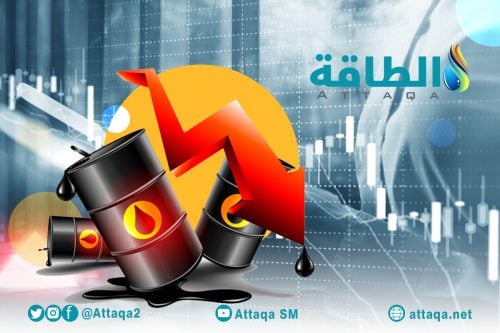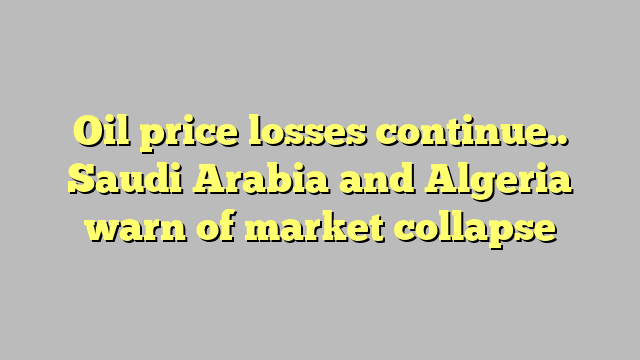Oil prices continued their losses for the third day, recording their lowest level in more than a year, on the back of fears of a global economic collapse, in the wake of the bankruptcy of a number of US banks, led by Silicon Valley Bank.
The uncertainty in the oil markets – amid US moves to restrict OPEC by introducing a “No OPEC” bill – prompted a number of major oil producers, led by Saudi Arabia and Algeria, to issue warnings of a market collapse.
Oil prices have lost more than $10.5 so far during the last three sessions, to plunge Brent crude from $82.78, with which trading began last Monday, to $72.23 a barrel, today, Wednesday, March 15, by 07:17 PM Mecca time.
Oil prices today
Oil prices fell about 7% during trading today, Wednesday, to their lowest level since December 2021, amid global market concerns about Credit Suisse, and fears of a greater collapse of the global economy.
 The largest investor in Egypt, Credit Suisse, refused to provide further financial assistance to the Swiss bank, which led to the collapse of European stocks.
The largest investor in Egypt, Credit Suisse, refused to provide further financial assistance to the Swiss bank, which led to the collapse of European stocks.
And by 04:17 pm today, Wednesday, GMT (07:17 pm Mecca time), the price of benchmark Brent crude futures – delivery in May 2023 – fell by about 6.74%, to reach $ 72.23 a barrel.
The price of US West Texas crude futures – delivery in April 2023 – fell by 6.84%, to $66.45 a barrel, according to data viewed by the specialized energy platform.
During Tuesday’s trading, both benchmarks fell by more than 4% to their lowest levels in 3 months, under the pressure of fears that the collapse of the Silicon Valley bank last week and the failures of other US banks could lead to a financial crisis that would affect the demand for fuel.
Is OPEC + moving?
Sources in OPEC + said, a while ago, that the decline in oil prices is a “natural reaction” to what is happening in the market.
The sources added, in exclusive statements to the energy platform, on Wednesday, March 15: “The coalition does not intend to change the production policy in the current period.”
She explained that there is a consensus within OPEC + against the idea of an oil price ceiling.
Economic recession
The failure of the Silicon Valley bank raised concerns about the risks to other banks from sharp increases in US federal interest rates over the past year, as well as speculation about whether the central bank could slow the pace of its monetary tightening.
Oil prices have been hit by the fallout from the recent collapse of the Silicon Valley bank, senior advisor on foreign policy and energy geopolitics Umod Choukri, citing the main reason behind the sharp drop in fuel demand resulting from the large-scale downsizing of technology companies, along with the reduction of their staff. travel expenses.
He pointed out – in exclusive statements to the energy platform – that since many emerging companies in the technology sector were seen as potential consumers of oil and gas in the future, the collapse of their main financier led to a decrease in expectations related to the growth of oil demand in the future.
For her part, the founder of the “Vanda Insights” center on energy markets, Vandana Hari, said that the collapse of the Silicon Valley bank caused panic reactions in the oil market, and this was reflected in prices.
OPEC+ position
OPEC+ countries, led by Saudi Arabia and Algeria, have warned of the collapse of oil markets in light of US moves to bring the “No OPEC” law back to the fore at a time when markets are suffering from multiple crises and a significant decline in investments.

And the Saudi Energy Minister, Prince Abdulaziz bin Salman, announced that the OPEC + alliance adhered to the policy of reducing the production ceiling by two million barrels per day, starting from November (2022) and until the end of 2023.
He said, “It is not possible to form a future outlook on the oil market in light of the state of uncertainty experienced by the global economy,” explaining that “the economic recovery creates inflationary pressures, and this may prompt central banks to intensify their efforts to curb inflation,” according to his statements on Tuesday evening, March 14. This March.
The Saudi official indicated that talking about imposing a ceiling on oil prices for some producing countries or re-introducing the “No OPEC” law will exacerbate market instability and fluctuations, and negatively affect the oil industry, at a time when OPEC + has succeeded in achieving stability and high transparency in the market. oil.
For his part, Algerian Energy Minister Mohamed Arkab warned today, Wednesday, March 15, that the efforts made by the OPEC + alliance for more than 6 years could collapse unfairly, if unilateral measures and legislation were adopted aimed at misleading market mechanisms.
He said that such measures exacerbate the crisis of lack of investment in the oil industry, and create disturbances in supply flows, explaining that the OPEC + countries have shown exceptional wisdom and foresight by taking the decision to reduce their production by two million barrels, in order to ensure the stability of the global oil market and its balance in favor of the economy. Global.
For her part, Dr. Carol Nakhle, CEO of Kristol Energy, an energy research and consulting company, ruled out that OPEC would take a quick decision at the present time, but if oil prices remain in a downward trend, it is possible to talk about a change in policies.
And she said – in statements to the specialized energy platform – that it is still too early to determine whether OPEC will intervene, especially with not knowing whether the current reaction is temporary, and expresses some concerns, or that its impact will be continuous.
related topics..
Also read..

Leave a Reply